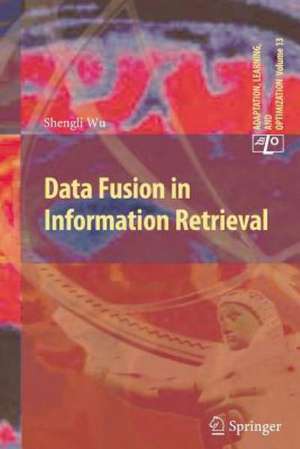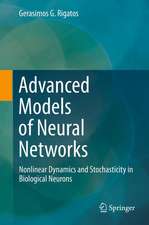Data Fusion in Information Retrieval: Adaptation, Learning, and Optimization, cartea 13
Autor Shengli Wuen Limba Engleză Paperback – 9 mai 2014
What are the key factors that affect the performance of data fusion algorithms significantly?
What conditions are favorable to data fusion algorithms?
CombSum and CombMNZ, which one is better? and why?
What is the rationale of using the linear combination method?
How can the best fusion option be found under any given circumstances?
| Toate formatele și edițiile | Preț | Express |
|---|---|---|
| Paperback (1) | 984.18 lei 6-8 săpt. | |
| Springer Berlin, Heidelberg – 9 mai 2014 | 984.18 lei 6-8 săpt. | |
| Hardback (1) | 990.48 lei 6-8 săpt. | |
| Springer Berlin, Heidelberg – 7 apr 2012 | 990.48 lei 6-8 săpt. |
Din seria Adaptation, Learning, and Optimization
- 15%
 Preț: 641.71 lei
Preț: 641.71 lei - 15%
 Preț: 634.32 lei
Preț: 634.32 lei - 20%
 Preț: 983.85 lei
Preț: 983.85 lei - 20%
 Preț: 648.44 lei
Preț: 648.44 lei - 20%
 Preț: 2196.22 lei
Preț: 2196.22 lei - 20%
 Preț: 985.35 lei
Preț: 985.35 lei - 20%
 Preț: 653.38 lei
Preț: 653.38 lei - 20%
 Preț: 648.59 lei
Preț: 648.59 lei - 15%
 Preț: 640.37 lei
Preț: 640.37 lei - 20%
 Preț: 649.43 lei
Preț: 649.43 lei - 20%
 Preț: 651.42 lei
Preț: 651.42 lei - 18%
 Preț: 1837.57 lei
Preț: 1837.57 lei - 20%
 Preț: 646.62 lei
Preț: 646.62 lei - 20%
 Preț: 927.45 lei
Preț: 927.45 lei - 20%
 Preț: 651.75 lei
Preț: 651.75 lei - 20%
 Preț: 646.47 lei
Preț: 646.47 lei - 20%
 Preț: 986.66 lei
Preț: 986.66 lei - 20%
 Preț: 638.55 lei
Preț: 638.55 lei - 20%
 Preț: 983.39 lei
Preț: 983.39 lei - 20%
 Preț: 991.14 lei
Preț: 991.14 lei - 15%
 Preț: 638.57 lei
Preț: 638.57 lei - 15%
 Preț: 640.88 lei
Preț: 640.88 lei - 20%
 Preț: 637.23 lei
Preț: 637.23 lei - 20%
 Preț: 1449.13 lei
Preț: 1449.13 lei - 20%
 Preț: 1284.47 lei
Preț: 1284.47 lei - 20%
 Preț: 985.35 lei
Preț: 985.35 lei
Preț: 984.18 lei
Preț vechi: 1230.22 lei
-20% Nou
Puncte Express: 1476
Preț estimativ în valută:
188.33€ • 197.28$ • 156.08£
188.33€ • 197.28$ • 156.08£
Carte tipărită la comandă
Livrare economică 08-22 aprilie
Preluare comenzi: 021 569.72.76
Specificații
ISBN-13: 9783642448010
ISBN-10: 3642448011
Pagini: 240
Ilustrații: XII, 228 p.
Dimensiuni: 155 x 235 x 13 mm
Greutate: 0.34 kg
Ediția:2012
Editura: Springer Berlin, Heidelberg
Colecția Springer
Seria Adaptation, Learning, and Optimization
Locul publicării:Berlin, Heidelberg, Germany
ISBN-10: 3642448011
Pagini: 240
Ilustrații: XII, 228 p.
Dimensiuni: 155 x 235 x 13 mm
Greutate: 0.34 kg
Ediția:2012
Editura: Springer Berlin, Heidelberg
Colecția Springer
Seria Adaptation, Learning, and Optimization
Locul publicării:Berlin, Heidelberg, Germany
Public țintă
ResearchCuprins
Introduction.- Evaluation of Retrieval Results.- Score Normalization.- Observations and Analyses.- The Linear Combination Method.- A Geometric Framework for Data Fusion.- Ranking-Based Fusion.- Fusing Results from Overlapping Databases.- Application of the Data Fusion Technique.
Recenzii
From the reviews:
“This book is … the result of a 10-year long engagement in data fusion within the context of various research projects. … The book is written in a very concise and dense manner, which makes it … readable for the expert, in particular the one with a good mathematical background. It contains a lot of evaluation results that help compare the various fusion methods presented, which is helpful for the practitioner. It also gives a good overview … of applications of data fusion.” (Gottfried Vossen, Zentralblatt MATH, Vol. 1246, 2012)
“This book is … the result of a 10-year long engagement in data fusion within the context of various research projects. … The book is written in a very concise and dense manner, which makes it … readable for the expert, in particular the one with a good mathematical background. It contains a lot of evaluation results that help compare the various fusion methods presented, which is helpful for the practitioner. It also gives a good overview … of applications of data fusion.” (Gottfried Vossen, Zentralblatt MATH, Vol. 1246, 2012)
Textul de pe ultima copertă
The technique of data fusion has been used extensively in information retrieval due to the complexity and diversity of tasks involved such as web and social networks, legal, enterprise, and many others. This book presents both a theoretical and empirical approach to data fusion. Several typical data fusion algorithms are discussed, analyzed and evaluated. A reader will find answers to the following questions, among others:
- What are the key factors that affect the performance of data fusion algorithms significantly?
- What conditions are favorable to data fusion algorithms?
- CombSum and CombMNZ, which one is better? and why?
- What is the rationale of using the linear combination method?
- How can the best fusion option be found under any given circumstances?
- What are the key factors that affect the performance of data fusion algorithms significantly?
- What conditions are favorable to data fusion algorithms?
- CombSum and CombMNZ, which one is better? and why?
- What is the rationale of using the linear combination method?
- How can the best fusion option be found under any given circumstances?
Caracteristici
Latest research on Data Fusion in Information Retrieval Includes various example applications such as developing more effective information retrieval systems, a more reliable comparison of retrieval results, the estimation of retrieval effectiveness, and world university ranking Written by a leading expert in the field

















